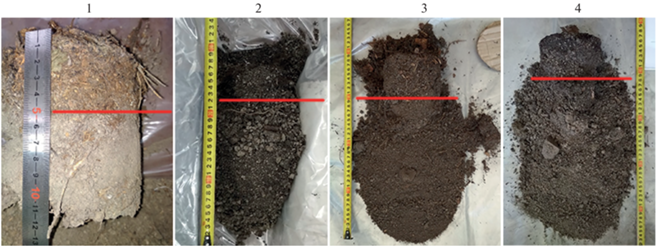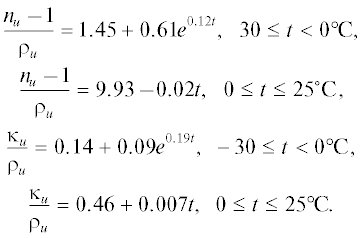Исследование Земли из Космоса, 2023, № 3, стр. 81-96
Диэлектрическая модель верхнего органического слоя лесных почв для частоты 435 МГц
А. Ю. Каравайский a, *, Ю. И. Лукин a
a Институт физики им. Л.В. Киренского СО РАН
Красноярск, Россия
* E-mail: rsdak@ksc.krasn.ru
Поступила в редакцию 28.06.2022
- EDN: TCWJRI
- DOI: 10.31857/S0205961423020021
Аннотация
Создана диэлектрическая модель, основанная на рефракционной диэлектрической модели смеси талых и мерзлых лесных органических почв корневой зоны для частоты 435 МГц. Модель разработана на основе диэлектрических измерений четырех почв, в которых содержание органического вещества варьировалось от 15 до 31%. Диэлектрические измерения были проведены в диапазоне массовой влажности от 0 до 0.6 г/г и диапазоне температур от –30 до 25°С. Коэффициент детерминации (R2) между рассчитанными с использованием модели и измеренными значениями действительной (ε') и мнимой (ε") частями комплексной диэлектрической проницаемости составил 0.97. Нормированное среднеквадратическое отклонение составило 16 и 21% для действительной и мнимой частей комплексной диэлектрической проницаемости соответственно. Разработанная диэлектрическая модель может быть применена в алгоритмах дистанционного зондирования при восстановлении значения влажности лесных почв корневой зоны из данных радарного и радиометрического зондирования.
ВВЕДЕНИЕ
Корневая зона лесных почв играет жизненно важную роль в регулировании почвенного, водного и минерально-органического баланса, необходимого для функционирования лесной экосистемы (Shukla, Mintz, 1982). Влажность деятельного слоя лесных почв является важной переменной для приложений в области гидрологии, сельского хозяйства, метеорологии и изменения климата (Garrison et al., 2017; Nagarajan et al., 2012; Sabater et al., 2007).
В настоящее время разработаны космические радиометрические методы измерения влажности в поверхностном слое почв толщиной до 5 см (Escorihuela et al., 2010; Monerris et al., 2006) в глобальном масштабе на основе данных спутников SMOS (Soil Moisture and Ocean Salinity) (Kerr et al., 2010; Pan et al., 2012) и SMAP (Soil Moisture Active Passive) (Entekhabi et al., 2010; Pan et al., 2016) в L-диапазоне частот (1.4 ГГц). Для почв, покрытых негустой растительностью, погрешность измерения объемной влажности радиометрическими методами составляет порядка 4% (Grant et al., 2010; Zhang et al., 2011). С целью увеличения глубины мониторинга влажности почв в последние годы активно ведутся исследования в области разработки методов дистанционного зондирования в P-диапазоне частот (Reigber et al., 2012; Garrison et al., 2017; Alemohammad et al., 2018; Carreiras et al., 2017). Показано, что глубина зондирования влажности почвы, непокрытой растительностью, на частоте 750 МГц с использованием наземного поляриметрического радиометра (угол наблюдения 30°) может достигать ~7–10 см (Ye et al., 2020; Shen et al., 2021). В ходе самолетных радарных поляриметрических наблюдений на частоте 435 МГц продемонстрирована возможность восстановления вертикального распределения влажности почвы до глубины порядка нескольких десятков сантиметров (Tabatabaeenejad et al., 2015). Европейским космическим агентством планируется к запуску спутник BIOMAS, оснащенный радаром синтезированной апертуры с рабочей частотой 435 МГц (P-band) (Alemohammad et al., 2018; Carreiras et al., 2017), что создает технологическую возможность дистанционного зондироавния влажности почвы под густой растительностью, включая лесной полог (Jagdhuber et al., 2012).
При этом модели комплексной диэлектрической проницаемости (КДП) почв являются одним из основных элементов в алгоритмах восстановления влажности почвы из радарных и радиометрических наблюдений с использованием физических моделей радарного рассеяния и радиотеплового излучения. До настоящего времени в P-диапазоне частот (435 МГц) не создано обобщенной диэлектрической модели для лесных почв, деятельный слой которых обладает значительным градиентом содержания органического вещества (Liebmann et al., 2020).
Существует ряд классических моделей, описывающих свойства дисперсных систем, в которые тем или иным образом входят диэлектрические проницаемости составляющих их веществ: модели Лихтенекера, Бруггемана–Хана, Брауна и Оделевского (Шутко, 1986). Сравнение результатов расчетов, полученных при использовании трехкомпонентных моделей (минерал–вода–воздух), с экспериментальными данными для образцов песка и глины с влажностями до 20% показало, что наилучшее совпадение дает рефракционная модель диэлектрической проницаемости смеси (Шутко, 1986). Однако при этом не учитывается то обстоятельство, что часть влаги в почве присутствует в форме связанной воды. Диэлектрическая проницаемость связанной воды должна находиться в пределах от значений диэлектрической проницаемости льда до значений диэлектрической проницаемости свободной воды в зависимости от влажности почвы (Wang, Schmugge, 1980; Dobson et al., 1985). В связи с этим необходимо учитывать содержание связанной воды и ее диэлектрическую проницаемость в моделях КДП почв (Миронов и др., 1994; Боярский, Тихонов, 1995; Боярский, Тихонов, 2003).
В работе (Mironov et al., 2005) в диапазоне частот 0.8–12.5 ГГц были продемонстрированы результаты измерений КДП тундрово-лесных почв, отобранных в г. Тура (Восточная Сибирь), содержание глинистой фракции и гумуса в которых варьировалось от 3.25 до 24% и от 0.28 до 4% соответственно. Для описания КДП почв авторами (Mironov et al., 2005) использовалась четырехкомпонентная рефракционная диэлектрическая модель, параметры которой находились для каждого почвенного образца в отдельности. В работе (Owe et al., 1998) на частоте 1.67 ГГц (L-диапазон) и 5 ГГц (С-диапазон) проведены измерения КДП лесной почвы с содержанием глинистой фракции и органического вещества 10.5 и 1.47% соответственно, на основе которых показано, что модель Шмагге–Ванга (Wang, Schmugge, 1980) точнее описывает зависимоть КДП почв от объемной влажности почвы по сравнению с моделью Добсона (Dobson et al., 1985). Разными авторами предпринимались попытки обобщить результаты диэлектрических измерений в широком диапазоне частот набора почвенных образцов со смешанным органоминеральным составом с использованием рефракционной диэлектрической модели (Мандрыгина, 2004, содержание гумуса в почвах 0.6, 6.6, 8.95, 100%; Бобров и др., 2008, содержание глинистой фракции и гумуса соответственно 0.3–12.8 и 4.35–56.1%; Репин, 2010; Бобров и др., 2013, содержание глинистой фракции и гумуса соответственно 0.8–72 и 0–6.6%; Беляева и др., 2013; Liu et al., 2013, содержание глинистой фракции и органического вещества от 6.7 до 68.7% и от 3 до 17.8% соответственно), а также с использованием других моделей КДП смеси (Park et al., 2017, 2019). Вследствие влияния релаксационных процессов Максвелла–Вагнера, обусловленных поляризацией межфазных границ вода–минерал, вода–воздух, наибольшая точность описания экспериментальных значений КДП в сверхшироком диапазоне частот от 1 кГц до 20 ГГц достигается при использовании комбинации многорелаксационной модели братьев Коул (Szypłowska et al., 2021) и рефракционной модели (Bobrov et al., 2022). В работе (Репин, 2010) показано, что использование многорелаксационной модели братьев Коул для описания КДП прочносвязанной воды дает большую точность, чем использование модели Дебая. При использовании комбинированной многорелаксационной диэлектрической модели параметры подбираются отдельно для каждого типа почвы и не удается получить общих зависимостей для всех параметров модели от содержания глинистой фракции и гумуса (Bobrov et al., 2022). Так, например, ранее авторами (Мандрыгина, 2004; Бобров и др., 2008; Liu et al., 2013) была предпринята попытка получить обобщенную формулу для количественной оценки максимального содержания связанной почвенной воды в зависимости от содержания глины и органического вещества (гумуса). Однако подобные обобщенные зависимости имеют низкую корреляцию между измеренными и рассчитанными по модели величинами максимального содержания связанной почвенной воды при сопоставлении с набором независимых данных (Бобров и др., 2008).
Вместе с тем показано, что модификация рефракционной модели с учетом локальных особенностей содержания глинистой фракции и гумуса в почвах редколесий северного Китая позволяет примерно в два раза улучшить точность восстановления влажности почвы: с 30 до 13% и с 16 до 7% соответственно, при использовании радиометрических данных спутников SMAP и SMOS на частоте 1.4 ГГц (Jin et al., 2017). Для рабочей частоты радиометров спутников SMAP и SMOS 1.4 ГГц проводились измерения КДП и создавались одночастотные специализированные модели почв, богатых органическим веществом, включая почвы бореальных лесов (Bircher et al., 2016). Авторами (Bircher et al., 2016) показано, что значения КДП влажных почв с высоким содержанием органики ниже значений КДП влажных почв с высоким содержанием минерального вещества, т.к. органические почвы содержат больше связанной воды, чем минеральные почвы, диэлектрическая проницаемость у которой меньше, чем у несвязанной воды. Проводились отдельные специализированные диэлектрические измерения лесных почв Индии на частоте 9.6 ГГц в диапазоне объемной влажности от 0 до 30% (Patil et al., 2018), серых лесных почв (Чашниково, Московская область) с содержаием почвенных частиц размером менее 0.001 мм 11% и органического вещества 1.8% на частоте 50 МГц (Chudinova, 2009), торфа (Васюганские болота) в диапазоне темпераутр от –30 до 30°С и в диапазоне частот от 10 МГц до 40 ГГц (Кочеткова, 2019).
Вместе с тем в литературе слабо представлены результаты исследования диэлектрических свойств органоминеральных лесных почв в P-диапазонах частот (на частоте 435 МГц) с целью разработки специализированных диэлектрических моделей для использования в алгоритмах спутника BIOMAS. Ранее на частоте 435 МГц были разработаны специализированные модели для минеральных (Fomin, Muzalevskiy, 2021) и органических (Savin, Muzalevskiy, Mironov, 2022) талых и мерзлых почв, образцы которых были отобраны в тундре (Аляска, п-ов Ямал, п-ов Таймыр). Созданные одночастотные модели КДП почв в сравнении со спектроскопическими моделями (Mironov et al., 2020; Peplinski, Ulaby, Dobson, 1995; Zhang et al., 2010) обладают повышенной точностью и имеют существенно меньшее количество входных параметров, что является преимуществом в прикладных задачах дистанционного зондирования, в которых нет необходимости в информации о более тонких параметрах модели, таких как КДП связанной воды, время релаксации, статическая диэлектрическая проницаемость, энтропия и энтальпия фазового перехода и др. (Бобров и др., 2021).
В настоящей статье для использования на частоте 435 МГц предложена одночастотная диэлектрическая модель талых и мерзлых органоминеральных почв, отобранных из верхнего слоя почвы преимущественно соснового, березового и смешанного лесов Красноярской лесостепи. Диэлектрическая модель создана на основе рефракционной модели смеси (Комаров, Миронов, 2000; Mironov et al., 2020), параметры которой определены в зависимости от температуры лесных почв.
МАТЕРИАЛЫ И МЕТОДЫ
Почвенные образцы были отобраны в виде цилиндрических кернов диаметром 110 мм и высотой 300 мм с поверхности почвы соснового, осинового, смешанного и березового лесов Красноярской лесостепи, Пировского района, Красноярского края. Для модификации рефракционной диэлектрической модели отбирался верхний слой кернов (от 5 до 10 см), который преимущественно содержал в себе остатки перегнившей и неперегнившей растительности, опада, корневой системы и небольшое количество земли (преимущественно черного цвета), которое оставалось на корнях растений (рис. 1). Координаты мест отбора образцов почв и содержание органического вещества приведены в табл. 1. Исследование осуществлялось для образцов почв с различной массовой влажностью от сухого состояния до влажности 0.6 г/г и в диапазоне температур от –30 до 25°С. Общая процедура подготовки образцов почв для измерений подробно описана в работе (Mironov, Bobrov, Fomin, 2013). Содержание органического вещества в почве определялось по ГОСТ 27784-88 и ГОСТ 26213-91, содержание гранулометрического состава определялось по методике Качинского (Агрохимические…, 1975) (ФГБУ ГЦАС “КРАСНОЯРСКИЙ”). Для почв с содержанием органического вещества больше 20% по методике Качинского определить гранулометрический состав оказалось невозможным, поэтому для этих почв сведения по гранулометрическому составу в табл. 1 отсутствуют.
Таблица 1.
Содержание органического вещества и гранулометрический состав исследуемых почв
| № | Координаты места | Тип леса | Массовая доля органического вещества, % | Содержание фракций, % | |||||
|---|---|---|---|---|---|---|---|---|---|
| 1–0.25 мм | 0.25–0.05 мм | 0.05–0.01 мм | 0.01–0.005 мм | 0.005–0.001 мм | < 0.001 | ||||
| 1 | 57°37′17.9″ N 92°13′00.6″ E |
Сосна | 21.4 | – | – | – | – | – | – |
| 2 | 57°37′22.8″ N 92°13′01.4″ E |
Осина | 31.1 | – | – | – | – | – | – |
| 3 | 57°37′21.1″ N 92°15′03.0″ E |
Смешанный | 27.8 | – | – | – | – | – | – |
| 4 | 57°39′45.0″ N 92°16′12.2″ E |
Береза | 14.8 | 2.8 | 10.8 | 47.3 | 10.5 | 12.8 | 15.8 |
Массовая влажность образцов почвы mg была определена как отношение массы воды в почве mw к массе сухой почвы md: mg = mw/md. Погрешность измерения влажности составляла от 3 до 5% в зависимости от значения массовой влажности. Всего было приготовлено по 20 образцов с различной влажностью для каждой почвы.
Измерения КДП влажных образцов проводились с использованием диэлектрического измерительного комплекса, в который входят: векторный анализатор цепей Keysight N5232, температурная камера SU-241 Espec, коаксиальный измерительный контейнер, персональный компьютер. Измеряемый образец почвы с заданной влажностью помещался в контейнер, выполненный в виде жесткой коаксиальной линии. Для измерений образцов с малой влажностью использовался контейнер длиной 37 мм, для образцов с высокой влажностью – контейнер длиной 17 мм. Радиус внешней оболочки обоих контейнеров составлял 7 мм, радиус центрального проводника – 3 мм. Измерения проводились в температурном диапазоне от –30 до 25°С. Для поддержания стабильной заданной температуры образца использовалась температурная камера SU-241 Espec. Точность установки температуры в камере составляет 0.1°С. С помощью векторного анализатора цепей были записаны амплитуды и фазы элемента матрицы рассеивания S12 влажных образцов почв на частоте электромагнитного поля 435 МГц. С помощью методики, изложенной в (Mironov et al., 2013), с использованием измеренных значений элемента матрицы рассеивания S12 были получены значения действительной и мнимой частей комплексного показателя преломления (КПП) влажных образцов минеральной почвы $n_{s}^{*} = {{n}_{s}} + i{{\kappa }_{s}}$, где ns и κs – показатель преломления (ПП) и нормированный коэффициент затухания (НКЗ) электромагнитной волны в измеряемом образце соответственно. Методика, изложенная в (Mironov et al., 2013), позволяет измерять КДП с погрешностью от 1 до 10% для вещественной части и от 6 до 30% для мнимой части КДП в зависимости от значений этих величин и частоты электромагнитного поля.
Величина КПП связана с КДП  следующим соотношением:
следующим соотношением:
ОДНОЧАСТОТНАЯ РЕФРАКЦИОННАЯ ДИЭЛЕКТРИЧЕСКАЯ МОДЕЛЬ
Для описания зависимостей КДП почв от влажности, в соответствии с (Миронов, Савин, 2019), была использована диэлектрическая модель, основанная на рефракционном уравнении диэлектрической проницаемости смеси. Ранее в работах (Mironov, Roo De, Savin, 2010; Миронов, Савин, 2019) при исследовании органических почв, отобранных в тундровых регионах, было идентифицировано три категории почвенной воды, а именно: прочносвязанная вода, рыхлосвязанная вода и несвязанная вода (или лед в мерзлой почве). Данная классификация была применена на основании различий значений КДП категорий воды во влажной почве. В связи с этим для исследуемых органических почв было использовано следующее рефракционное диэлектрическое уравнение смеси с тремя категориями почвенной воды:
(1)
$\frac{{{{n}_{s}}--~1}}{{{{\rho }_{d}}}} = \left\{ \begin{gathered} \frac{{{{n}_{m}}--~1}}{{{{\rho }_{m}}}} + \frac{{{{n}_{b}}--~1}}{{{{\rho }_{b}}}}{{m}_{g}},\,\,\,\,~{{m}_{g}} \leqslant {{m}_{{g1}}}, \hfill \\ \frac{{{{n}_{m}}--~1}}{{{{\rho }_{m}}}} + \frac{{{{n}_{b}}--~1}}{{{{\rho }_{b}}}}{{m}_{{g1}}} + \frac{{{{n}_{t}}--~1}}{{{{\rho }_{t}}}}\left( {{{m}_{g}}--~{{m}_{{g1}}}} \right), \hfill \\ {{m}_{{g1}}} < {{m}_{g}} \leqslant {{m}_{{g2}}}, \hfill \\ \frac{{{{n}_{m}}--~1}}{{{{\rho }_{m}}}} + \frac{{{{n}_{b}}--~1}}{{{{\rho }_{b}}}}{{m}_{{g1}}} + \frac{{{{n}_{t}}--~1}}{{{{\rho }_{t}}}}\left( {{{m}_{{g2}}}--~{{m}_{{g1}}}} \right) + \hfill \\ + \,\,\frac{{{{n}_{{u,i}}}--~1}}{{{{\rho }_{{u,i}}}}}\left( {{{m}_{g}}--~{{m}_{{g2}}}} \right),\,\,\,\,{{m}_{g}} > {{m}_{{g2}}}, \hfill \\ \end{gathered} \right.$(2)
$\frac{{{{\kappa }_{s}}}}{{{{\rho }_{d}}}} = \left\{ \begin{gathered} \frac{{{{\kappa }_{m}}}}{{{{\rho }_{m}}}} + \frac{{{{\kappa }_{b}}}}{{{{\rho }_{b}}}}{{m}_{g}},\,\,\,\,{{m}_{g}} \leqslant {{m}_{{g1}}}, \hfill \\ \frac{{{{\kappa }_{m}}}}{{{{\rho }_{m}}}} + \frac{{{{\kappa }_{b}}}}{{{{\rho }_{b}}}}{{m}_{{g1}}} + \frac{{{{\kappa }_{t}}}}{{{{\rho }_{t}}}}\left( {{{m}_{g}}--~{{m}_{{g1}}}} \right), \hfill \\ {{m}_{{g1}}} < {{m}_{g}} \leqslant {{m}_{{g2}}}, \hfill \\ \frac{{{{\kappa }_{m}}}}{{{{\rho }_{m}}}} + \frac{{{{\kappa }_{b}}}}{{{{\rho }_{b}}}}{{m}_{{g1}}} + \frac{{{{\kappa }_{t}}}}{{{{\rho }_{t}}}}\left( {{{m}_{{g2}}}--~{{m}_{{g1}}}} \right) + \hfill \\ + \,\,\frac{{{{\kappa }_{{u,i}}}}}{{{{\rho }_{{u,i}}}}}\left( {{{m}_{g}}--~{{m}_{{g2}}}} \right),\,\,\,\,{{m}_{g}} > {{m}_{{g2}}}. \hfill \\ \end{gathered} \right.$В системах уравнений (1) и (2) индексы s, d, m, b, t, u и i относятся к влажной почве, сухой почве, органоминеральной компоненте, прочносвязанной воде, рыхлосвязанной воде, несвязанной воде и льду соответственно; ${{m}_{{g1}}}$ – максимально возможное содержание прочносвязанной воды по весу в почве; ${{m}_{{g2}}}$ – максимально возможное содержание общего количества связанной воды по весу в почве; ${{m}_{g}}$ – массовая влажность образца; ${{\rho }_{d}}$ – плотность сухого сложения почвы; ${{\rho }_{{b,t,u}}}$ – плотности категорий почвенной воды; ${{\rho }_{i}}$ – плотность льда. Уравнения (1) и (2) описывают зависимости от массовой влажности приведенных определенным образом к единой плотности величин ПП и НКЗ кусочно-линейными функциями с точками излома, соответствующими ${{m}_{{g1}}}$ и ${{m}_{{g2}}}$. Аппроксимация экспериментальных влажностных зависимостей ПП и НКЗ с использованием уравнений (1) и (2) дает возможность определить значения ${{m}_{{g1}}}$ и ${{m}_{{g2}}}$ во влажной почве при каждой температуре измерения. В качестве примера на рис. 2 символами показаны найденные зависимости приведенных ПП $\left( {{{\left( {{{n}_{s}}--~1} \right)} \mathord{\left/ {\vphantom {{\left( {{{n}_{s}}--~1} \right)} {{{\rho }_{d}}}}} \right. \kern-0em} {{{\rho }_{d}}}}} \right)$ и НКЗ $\left( {{{{{\kappa }_{s}}} \mathord{\left/ {\vphantom {{{{\kappa }_{s}}} {{{\rho }_{d}}}}} \right. \kern-0em} {{{\rho }_{d}}}}} \right)$ почв от влажности при температурах 20 и –20°С. Как можно увидеть на рис. 2, значения КПП в зависимости от влажности действительно могут быть описаны кусочно-линейной функцией с двумя изломами. Значение влажности ${{m}_{{g1}}}$, определяющее первую точку излома влажностной зависимости приведенных ПП и НКЗ, следует отнести к граничной влажности, разделяющей диапазоны влажностей, относящиеся к прочносвязанной и рыхлосвязанной воде, а значение ${{m}_{{g2}}}$, определяющее вторую точку излома – к граничной влажности, разделяющей диапазоны влажностей, относящиеся к рыхлосвязанной и несвязанной воде или льду. Данные диапазоны отмечены на рис. 2 вертикальными пунктирными линиями. Таким образом, при анализе влажностных зависимостей, показанных на рис. 2, на частоте 435 МГц не удалось разделить по своим диэлектрическим свойствам воду, связанную на поверхности минеральных частиц, и воду, связанную на поверхности органических частиц, для рассматриваемых почв. Поэтому все параметры модели диэлектрической проницаемости, относящиеся к характеристикам категорий связанной воды, как и в работах (Mironov, Roo De, Savin, 2010; Миронов, Савин, 2019), будут эффективными для всего объема воды, связанной на минеральных и органических частицах.
Рис. 2.
Приведенные ПП и НКЗ измеренных почв при температурах 20°С (а), (в) и –20°С (б), (г) в зависимости от массовой влажности на частоте 435 МГц. Экспериментальные данные – символы, результат аппроксимации – линии. Номера соответствуют номерам почв из табл. 1.
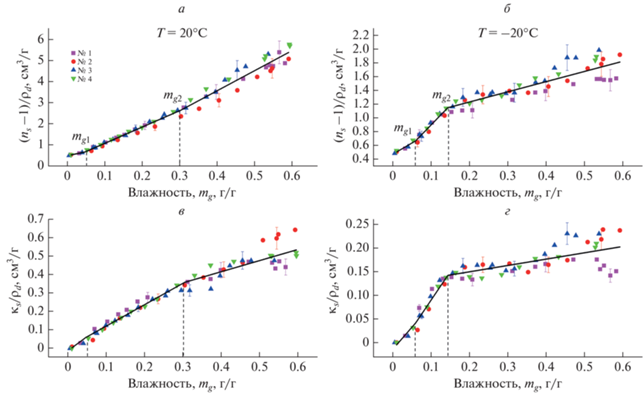
На рис. 2 видно, что вариации величин приведенных ПП и НКЗ для различных почв при одинаковых влажностях невелики. В областях, относящихся к прочносвязанной и рыхлосвязанной воде, значения приведенных ПП и НКЗ для различных почв практически совпадают друг с другом, а в области несвязанной воды лишь незначительно превышают пределы погрешностей измерений этих величин. Это может свидетельствовать о том, что приведенные ПП и НКЗ твердой компоненты $\left( {\frac{{{{n}_{m}}--~1}}{{{{\rho }_{m}}}},\,\,\frac{{{{\kappa }_{m}}}}{{{{\rho }_{m}}}}} \right)$, прочносвязанной воды $\left( {\frac{{{{n}_{b}}--~1}}{{{{\rho }_{b}}}},\,\,\frac{{{{\kappa }_{b}}}}{{{{\rho }_{b}}}}} \right)$, рыхлосвязанной воды $\left( {\frac{{{{n}_{t}}--~1}}{{{{\rho }_{t}}}},\,\,\frac{{{{\kappa }_{t}}}}{{{{\rho }_{t}}}}} \right)$ и несвязанной воды (или льда) $\left( {\frac{{{{n}_{{u,i}}}--~1}}{{{{\rho }_{{u,i}}}}},\,\,\frac{{{{\kappa }_{{u,i}}}}}{{{{\rho }_{{u,i}}}}}} \right)$, слабо зависят или вовсе не зависят от содержания органического вещества для исследуемых почв. Анализируя значения параметров ${{m}_{{g1}}}$ и ${{m}_{{g2}}}$ для почв с различным содержанием органического вещества, на положительных температурах была обнаружена слабая зависимость ${{m}_{{g2}}}$ от содержания органического вещества. На отрицательных температурах такой зависимости обнаружено не было. Принимая во внимание вышесказанное, было принято решение исключить из модели величину содержания органического вещества в качестве параметра. Таким образом, все параметры модели, описанные уравнениями (1) и (2), были общими для образцов с содержанием органического вещества от 14.8 до 31.1%. В результате применения такого подхода было сокращено число параметров разрабатываемой модели, что позволило ее немного упростить.
Поиск параметров диэлектрической модели осуществлялся с помощью процедуры аппроксимации полученных влажностных зависимостей приведенных ПП и НКЗ образцов почв с применением формул (1) и (2) в качестве теоретической модели. Ввиду того, что было принято решение не учитывать содержание органического вещества, аппроксимация проводилась одновременно для ПП и НКЗ всех четырех исследуемых почв на каждой температуре измерений. Результаты аппроксимации показаны на рис. 2 сплошными линиями.
Учитывая, что предлагаемая диэлектрическая модель была упрощена в результате исключения из нее влияния содержания органического вещества, необходимо было оценить потерю ее точности при таком допущении. Для этого была построена диэлектрическая модель, которая учитывает влияние вариации содержания органического вещества в исследуемых почвах на параметры модели. После чего был проведен анализ погрешностей двух моделей КДП органических почв: с учетом и без учета зависимости параметров модели КДП от содержания органического вещества в почве. Результаты данного анализа приведены в следующем разделе.
В результате аппроксимации влажностных зависимостей приведенных ПП и НКЗ почв были получены значения параметров $\left( {\frac{{{{n}_{m}}--~1}}{{{{\rho }_{m}}}}} \right)$, $\left( {\frac{{{{\kappa }_{m}}}}{{{{\rho }_{m}}}}} \right)$, $\left( {\frac{{{{n}_{b}}--~1}}{{{{\rho }_{b}}}}} \right)$, $\left( {\frac{{{{\kappa }_{b}}}}{{{{\rho }_{b}}}}} \right)$, $\left( {\frac{{{{n}_{t}}--~1}}{{{{\rho }_{t}}}}} \right)$, $\left( {\frac{{{{\kappa }_{t}}}}{{{{\rho }_{t}}}}} \right)$, $\left( {\frac{{{{n}_{{u,i}}}--~1}}{{{{\rho }_{{u,i}}}}}} \right)$, $\left( {\frac{{{{\kappa }_{{u,i}}}}}{{{{\rho }_{{u,i}}}}}} \right)$, ${{m}_{{g1}}}$ и ${{m}_{{g2}}}$ для каждой температуры из диапазона измерений, не зависящие от содержания органического вещества. Значения параметров ${{m}_{{g1}}}$ и ${{m}_{{g2}}}$ показаны символами на рис. 3. На рис. 3 видно, что ${{m}_{{g1}}}$ в пределах ошибок измерений остается постоянной величиной, равной 0.06 ± 0.01 г/г во всем диапазоне температур измерений. Величина ${{m}_{{g2}}}$ слабо меняется в области положительных температур и в среднем составляет 0.31 ± 0.06 г/г. При отрицательных температурах, с понижением температуры, значение ${{m}_{{g2}}}$ уменьшается по экспоненциальному закону от значения 0.24 до 0.13 г/г.
Рис. 3.
Максимальное содержание прочносвязанной воды ${{m}_{{g1}}}$ и общее содержание связанной воды ${{m}_{{g2}}}$ в образцах органических почв.
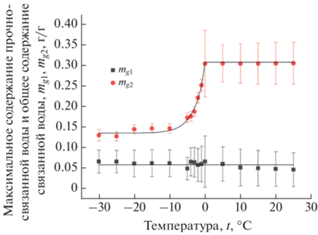
Для описания температурных зависимостей ${{m}_{{g1}}}$ и ${{m}_{{g2}}}$ с помощью аппроксимации экспериментальных данных, приведенных на рис. 3, были получены следующие эмпирические формулы:
(3)
$\begin{gathered} {{m}_{{g1}}} = 0.058,~\,\,\,\,\,--~30 \leqslant t \leqslant 25~^\circ {\text{C}}, \hfill \\ {{m}_{{g2}}} = \left\{ \begin{gathered} 0.13~\,\, + \,\,~0.16~\exp \left( {0.32~~t} \right), \hfill \\ ~--~30 \leqslant t < 0~^\circ {\text{C}}, \hfill \\ 0.307,\,\,\,\,~0 \leqslant t \leqslant 25~^\circ {\text{C}}.~ \hfill \\ \end{gathered} \right. \hfill \\ \end{gathered} $Рассчитанные по формуле (3) значения ${{m}_{{g1}}}$ и ${{m}_{{g2}}}$ показаны на рис. 3 сплошными линиями.
Применяя метод аппроксимации к полученным влажностным зависимостям приведенных ПП и НКЗ исследуемых почв на каждой измеренной температуре, с использованием уравнений (1) и (2) в качестве теоретической модели, были получены температурные зависимости параметров, характеризующих ПП и НКЗ органоминеральной компоненты, прочносвязанной воды, рыхлосвязанной воды, несвязанной воды и льда. Найденные экспериментальные зависимости этих параметров приведены на рис. 4. Для полученных экспериментальных температурных зависимостей параметров с помощью аппроксимации были найдены следующие эмпирические формулы:
(4)
$\frac{{{{n}_{m}}--~1}}{{{{\rho }_{m}}}} = 0.48,\,\,\,\,\frac{{{{\kappa }_{m}}}}{{{{\rho }_{m}}}} = 0.005,$(5)
$\begin{gathered} \frac{{{{n}_{b}}--~1}}{{{{\rho }_{b}}}} = 3.59, \\ \frac{{{{\kappa }_{b}}}}{{{{\rho }_{b}}}} = 0.81 + 0.63{{e}^{{0.11t}}},~\,\,\,\,~--~30 \leqslant t < 0~^\circ {\text{C}},~ \\ \frac{{{{\kappa }_{b}}}}{{{{\rho }_{b}}}} = 1.34 + 0.01t,\,\,\,\,~0 \leqslant t \leqslant 25~^\circ {\text{C}}, \\ \end{gathered} $(6)
$\begin{gathered} \frac{{{{n}_{t}}--~1}}{{{{\rho }_{t}}}} = 7.03 + 0.05t,\,\,\,\,--~30 \leqslant t < 0~^\circ {\text{C}}, \\ \frac{{{{n}_{t}}--~1}}{{{{\rho }_{t}}}} = 7.68,\,\,\,\,~0 \leqslant t \leqslant 25~^\circ {\text{C}}, \\ \frac{{{{\kappa }_{t}}}}{{{{\rho }_{t}}}} = 0.83--~0.02t,\,\,\,\,--~30 \leqslant t < 0~^\circ {\text{C}}, \\ \frac{{{{\kappa }_{t}}}}{{{{\rho }_{t}}}} = 0.83 + 0.02t,~\,\,\,\,~0 \leqslant t \leqslant 25~^\circ {\text{C}}, \\ \end{gathered} $Рис. 4.
Температурные зависимости приведенных ПП n (а) и НКЗ κ (б) для органоминеральной компоненты (1), прочносвязанной воды (2), рыхлосвязанной воды (3) и несвязанной воды (или льда) (4) на частоте 435 МГц.
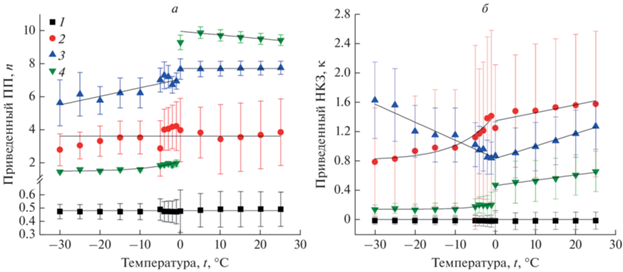
Формулы (1)–(7) составляют температурно-зависимую диэлектрическую модель верхнего органического горизонта лесных почв для мерзлого и талого состояния на частоте 435 МГц. Входными параметрами разработанной модели КДП являются плотность сухой почвы ρd, массовая влажность mg и температура t.
На рис. 4, б можно видеть, что при отрицательных температурах наблюдается рост приведенного НКЗ рыхлосвязанной воды с уменьшением температуры, тогда как для остальных категорий почвенной воды величина НКЗ убывает. Возможными причинами такого отличия температурных зависимостей НКЗ категорий почвенной воды в мегагерцовом диапазоне частот может быть влияние проводимости категорий почвенной воды в совокупности с релаксационными процессами, связанными с межфазной поляризацией Максвелла–Вагнера (Loewer, 2016; Миронов, 2019). Авторами работы (Миронов, 2019) для прочносвязанной воды в органических почвах арктического региона в мегагерцовом диапазоне частот было обнаружено наличие двух релаксационных процессов, при этом вклад данных релаксаций в спектр КДП прочносвязанной воды уменьшался с уменьшением температуры в диапазоне температур от 25 до –30°С, тем самым уменьшая вещественную и мнимую часть КПП. В несвязанной воде межфазных релаксаций в органической почве обнаружено не было. В рыхлосвязанной воде частота максимума поглощения электромагнитной волны, обусловленного релаксацией Максвелла-Вагнера, изменялась от 1.6 ГГц до 280 МГц при уменьшении температуры, при этом на частотах ниже частоты максимального поглощения электромагнитного поля за счет диэлектрической релаксации величина НКЗ увеличивается с уменьшением температуры вследствие сдвига максимума поглощения в область более низких частот, а затем НКЗ уменьшается после температуры, на которой частота электромагнитного поля совпадает с частотой максимума поглощения. Таким образом, изменение частоты максимумы поглощения электромагнитного поля за счет релаксации Максвелла-Вагнера в рыхлосвязанной воде могло привести к изменению характера показанной на рис. 4, б температурной зависимости приведенного НКЗ рыхлосвязанной воды на частоте 435 МГц и температуре около 0°С.
Как видно на рис. 4, б, найденные значения приведенных НКЗ категорий воды имеют довольно высокие погрешности с учетом малости самих величин. Данные погрешности рассчитывались как стандартная ошибка параметров, полученных при численной процедуре аппроксимации влажностных зависимостей приведенных величин ПП и НКЗ почвы, показанных на рис. 2. На величины рассчитанных ошибок повлияли близкие значения НКЗ прочносвязанной и рыхлосвязанной воды на частоте 435 МГц и разброс экспериментальных точек относительно теоретической кусочно-линейной зависимости, описанной формулами (1) и (2). Одной из причин разброса экспериментальных точек на рис. 2 является погрешность измерения самих величин ПП и НКЗ, причем для НКЗ относительная погрешность будет выше в силу того, что ее значения на частоте 435 МГц значительно ниже, чем значения ПП. Другими причинами являются погрешности измерения влажности и плотности образцов, возможные вариации гранулометрического и химического состава в образцах почв, на которые был разделен керн.
ОЦЕНКА ПОГРЕШНОСТИ РАЗРАБОТАННОЙ ДИЭЛЕКТРИЧЕСКОЙ МОДЕЛИ
Погрешности разработанной одночастотной рефракционной диэлектрической модели (ОРДМ) оценивались путем сравнения рассчитанных с помощью модели значений КДП с соответствующими измеренными значениями. В качестве примера на рис. 5 символами показаны результаты измерений ДП и КП четырех исследуемых почв в зависимости от температуры для нескольких влажностей. Также на рис. 5 сплошными линиями показаны результаты расчетов по предложенной диэлектрической модели как для талого, так и для мерзлого состояния верхнего органического слоя лесных почв. Как видно на рис. 5, наблюдается хорошее соответствие между расчетными и измеренными значениями КДП влажных почв во всем диапазоне температур измерений.
Рис. 5.
Значения ДП и КП влажных образцов почв в зависимости от температуры: почва № 1 – а, б; почва № 2 – в, г; почва № 3 – д, е; почва № 4 – ж, з. Измеренные значения показаны символами, сплошные линии соответствуют значениям КДП почвы, рассчитанным с использованием разработанной модели.
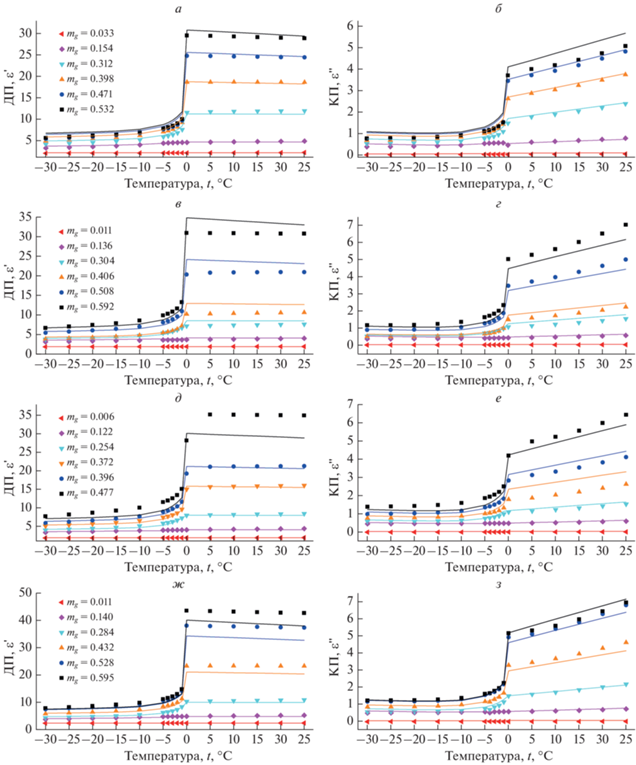
На рис. 6 показаны вычисленные с помощью разработанной ОРДМ значения ДП и КП исследуемых почв в зависимости от их измеренных значений. С целью оценки погрешности предложенной модели КДП почв для приведенных на рис. 6 данных были рассчитаны нормированное среднеквадратическое отклонение (НСКО) модельных значений от измеренных и коэффициент детерминации R2. Формулы для вычисления НСКО и R2 имеют следующий вид:
(8)
${\text{НСКО}} = \frac{{\sqrt {\frac{{\sum\limits_{j = 1}^n {{{{\left( {{{x}_{j}}--~{{y}_{j}}} \right)}}^{2}}} }}{n}} }}{{\bar {x}}} \times 100\% ,$(9)
${{R}^{2}} = 1--~\frac{{\sum\limits_j {{{{\left( {{{x}_{j}}--~{{y}_{j}}} \right)}}^{2}}} }}{{\sum\limits_j {{{{\left( {{{x}_{j}}--~\bar {x}} \right)}}^{2}}} }},$Рис. 6.
Вычисленные с помощью разработанной диэлектрической модели значения ДП (а) и КП (б) исследуемых почв в зависимости от их измеренных значений. Сплошными линиями показаны результаты линейной аппроксимации.
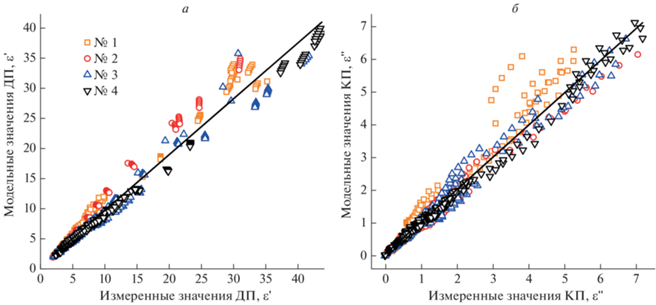
Таблица 2.
Погрешности диэлектрических моделей для исследуемых органических почв.
| НСКО, % | R2 | |||
|---|---|---|---|---|
| $\varepsilon {\kern 1pt} '$ | $\varepsilon {\kern 1pt} ''$ | $\varepsilon {\kern 1pt} '$ | $\varepsilon {\kern 1pt} ''$ | |
| ОРДМ | 16 | 21 | 0.97 | 0.97 |
| ОРДМ СО | 14 | 22 | 0.98 | 0.96 |
Для того чтобы оценить потерю точности предложенной модели КДП вследствие исключения из рассмотрения зависимости параметров модели от содержания органического вещества в почвах, была оценена погрешность и для одночастотной рефракционной диэлектрической модели КДП лесных почв, учитывающей вариации содержания органического вещества в исследуемых почвах (ОРДМ СО). Значения НСКО и R2 для ОРДМ СО также приведены в табл. 2. Анализируя данные из табл. 2, можно сделать вывод, что учет влияния вариации содержания органического вещества на параметры модели КДП не оказывает существенного влияния на точность модели. Разница между значениями НСКО при использовании моделей с учетом и без учета в качестве параметра модели величины содержания органического вещества для значений ДП составила менее 3%, а для значений КП – менее 1%. Это подтверждает обоснованность исключения зависимости параметров модели КДП исследованных лесных почв от величины содержания в них органического вещества.
ЗАКЛЮЧЕНИЕ
В данной работе была предложена одночастотная диэлектрическая модель талых и мерзлых органических лесных почв корневой зоны на частоте 435 МГц, созданная на основе рефракционной диэлектрической модели смеси. Разработанная диэлектрическая модель применима для прогнозирования КДП верхнего слоя почв соснового, осинового, смешанного и березового лесов Красноярской лесостепи с содержанием органического вещества от 15 до 31%, с массовой влажностью от 0 до 0.6 г/г и в диапазоне температур от –30 до 25°С. По сравнению со спектроскопическими диэлектрическими моделями, разработанными в работах (Mironov et al., 2020; Миронов, Савин, 2019), предложенная одночастотная модель является более простой для практического применения, так как имеет минимальное число входных параметров, которые включают массовую влажность, температуру и плотность сухого сложения почвы. При анализе погрешностей созданной модели КДП почв было обосновано отсутствие необходимости учета зависимости параметров модели от величины содержания органического вещества, поскольку потеря точности при исключении из рассмотрения такой зависимости составляет по проведенным оценкам менее 3% для величины ДП и менее 1% для величины КП. Впервые для лесных почв Красноярской лесостепи диэлектрическим методом оценено предельное содержание связанной воды в зависимости от температуры.
Разработанная диэлектрическая модель может быть использована для интерпретации данных дистанционного зондирования на частоте 435 МГц, а также в алгоритмах измерения влажности, определения талого-мерзлого состояния лесных почв.
Список литературы
Агрохимические методы исследования почв / ред. Соколов А. В. М.: Наука, 1975. 656 с.
Беляева Т.А., Бобров П.П., Кондратьева О.В. Изменение диэлектрических свойств связанной воды в почвах при увеличении ее количества // Вестник СибГАУ. 2013. № 5(51). С. 92–95.
Бобров П.П., Беляева Т.А., Крошка Е.С., Родионова О.В. О параметрах диэлектрической модели почв, используемой в алгоритме SMOS // Техника радиосвязи. 2021. Вып. 1(48). С. 95–102. https://doi.org/10.33286/2075-8693-2021-48-95-102
Бобров П.П., Кондратьева О.В., Мустакова М.М. Влияние содержания органического вещества в почвах на диэлектрическую проницаемость в диапазоне частот 10–8.5 ГГц // Вестник СибГАУ. 2013. № 5(51). С. 95–97.
Бобров П.П. Спектроскопическая модель диэлектрической проницаемости почв, использующая стандартизованные агрофизические показатели // Исслед. Земли из Космоса. 2008. № 1. С. 15–23.
Боярский Д.А., Тихонов В.В. Модель эффективной диэлектрической проницаемости влажных и мерзлых почв в сверхвысокочастотном диапазоне // Радиотехника и электроника. 1995. Т. 40. № 6. С. 914–917.
Боярский Д.А., Тихонов В.В. Влияние связанной воды на диэлектрическую проницаемость влажных и мерзлых почв // 2003.
Комаров А.С., Миронов В.Л. Микроволновое зондирование почв. Новосибирск. Изд-во СО РАН. 2000. 289 с.
Кочеткова Т.Д. Температурная зависимость диэлектрической проницаемости торфа на СВЧ // 8-я Международная научно-практическая конференция Актуальные проблемы радиофизики. 2019. Тезисы докл. С. 196–199.
Мандрыгина В.Н. Диэлектрическая проницаемость почв с различным содержанием гумуса и влияние на нее гидрофобных и гидрофильных загрязнителей // Автореф дис на соиск уч. степ. к. ф.-м. н: Омский пед гос унт. 2004. 16 с.
Миронов В.Л., Комаров С.А., Рычкова Н.В., Клещенко В.Н., Изучение диэлектрических свойств влажных почвогрунтов в СВЧ-диапазоне // Исслед. Земли из космоса. 1994. № 4. С. 18–24.
Миронов В.Л., Савин И.В. Спектроскопическая многорелаксационная диэлектрическая модель талых и мерзлых арктических почв, учитывающая зависимости от температуры и содержания органического вещества // Исслед. Земли из Космоса. 2019. № 1. С. 62–73. https://doi.org/10.31857/S0205-96142019162-73
Музалевский К.В. Возможности дистанционного зондирования профилей влажности почв на основе поляриметрических наблюдений обратного рассеяния волн в P- и C-диапазонах частот // Современные проблемы дистанционного зондирования Земли из космоса. 2019. Т. 16. № 5. С. 203–216. https://doi.org/10.21046/2070-7401-2019-16-5-203-216
Репин А.В. Методы измерения диэлектрической проницаемости различных форм почвенной влаги и нефтесодержащих пород // Автореф дис на соиск уч. степ. к. ф.-м .н: Омский государственный педагогический университет. 2010. 22 с.
Шутко А.М. СВЧ-радиометрия водной поверхности и почвогрунтов // Наука, 1986.
Alemohammad S.H., Konings A.G., Jagdhuber T., Moghaddam M., Entekhabi D. Characterization of vegetation and soil scattering mechanisms across different biomes using P-band SAR polarimetry // Remote Sens. Environ. 2018. V. 209. P. 107–117. https://doi.org/10.1016/j.rse.2018.02.032
Bobrov P.P., Belyaeva T.A., Kroshka E.S., Rodionova O.V. The Effect of Dielectric Relaxation Processes on the Complex Dielectric Permittivity of Soils at Frequencies From 10 kHz to 8 GHz—Part I: Experimental // IEEE Transactions on Geoscience and Remote Sensing. 2022. V. 60. P. 1–9. https://doi.org/10.1109/TGRS.2022.3180727
Bircher S., Demontoux F., Zakharova E, Drusch M., Wigneron J.-P., Kerr Y.H. L-Band Relative Permittivity of Organic Soil Surface Layers—A New Dataset of Resonant Cavity Measurements and Model Evaluation // Remote Sensing. 2016. V. 8 № 12. P. 1024. https://doi.org/10.3390/rs8121024
Carreiras J.M.B., Quegan S., Le Toan T., Ho Tong Minh D., Saatchi S.S., Carvalhais N. Coverage of high biomass forests by the ESA BIOMASS mission under defense restrictions // Remote Sens. Environ. 2017. V. 196. P. 154–162. https://doi.org/10.1016/j.rse.2017.05.003
Chudinova S.M. Dielectric characteristics of soils and categories of soil water // Eurasian Soil Sc. 2009. V 42. P. 405–414. https://doi.org/10.1134/S1064229309040073
Dobson M., Ulaby F., Hallikainen M., El-rayes M. Microwave Dielectric Behavior of Wet Soil-Part II: Dielectric Mixing Models // IEEE Trans. Geosci. Remote Sens. 1985. V. GE-23. № 1. P. 35–46. https://doi.org/10.1109/TGRS.1985.289498
Entekhabi D., Njoku E.G., O’Neill P.E., Kellogg K.H., Crow W.T., Edelstein W.N., Entin J.K., Goodman S.D., Jackson T.J., Johnson J., Kimball J., Piepmeier J.R., Koster R.D., Martin N., McDonald K.C., Moghaddam M., Moran S., Reichle R., Shi J.C., Spencer M.W., Thurman S.W., Tsang L., Zyl J. Van. The Soil Moisture Active Passive (SMAP) Mission // Proc. IEEE. 2010. V. 98. № 5. P. 704–716. https://doi.org/10.1109/JPROC.2010.2043918
Escorihuela M.J., Chanzy A., Wigneron J.P., Kerr, Y.H. Effective soil moisture sampling depth of L-band radiometry: A case study // Remote Sens. Environ. 2010. V. 114. № 5. P. 995–1001. https://doi.org/10.1016/j.rse.2009.12.011
Fomin S.V., Muzalevskiy K. Dielectric Model for Thawed Mineral Soils at a Frequency of 435 MHz // IEEE Geosci. Remote Sens. Lett. 2021b. V. 18. № 2. P. 222–225. https://doi.org/10.1109/LGRS.2020.2972559
Garrison J., Lin Y.-C., Nold B., Piepmeier J.R., Vega M.A., Fritts M., Du Toit C.F., Knuble J. Remote sensing of soil moisture using P-band signals of opportunity (SoOp): Initial results // 2017 IEEE International Geoscience and Remote Sensing Symposium (IGARSS).: IEEE, 2017. P. 4158–4161. https://doi.org/10.1109/IGARSS.2017.8127917
Grant J.P., de Griend A.A. Van, Wigneron J.-P., Saleh K., Panciera R., Walker J.P. Influence of forest cover fraction on L-band soil moisture retrievals from heterogeneous pixels using multi-angular observations // Remote Sens. Environ. 2010. V. 114. № 5. P. 1026–1037. https://doi.org/10.1016/j.rse.2009.12.016
Jagdhuber T., Hajnsek I., Sauer S., Papathanassiou K.P., Bronstert A. Soil moisture retrieval under forest using polarimetric decomposition techniques at P-band // 9th European Conference on Synthetic Aperture Radar. 2012. P. 709–712.
Liu J., Zhao S., Jiang L., Chai L., Wu F. The influence of organic matter on soil dielectric constant at microwave frequencies (0.5–40 GHZ) // IEEE International Geoscience and Remote Sensing Symposium – IGARSS. 2013. P. 13–16. https://doi.org/10.1109/IGARSS.2013.6721080.
Jin M., Zheng X., Jiang T., Li X., Li X.-J., Zhao K. Evaluation and Improvement of SMOS and SMAP Soil Moisture Products for Soils with High Organic Matter over a Forested Area in Northeast China. Remote Sensing. 2017. V. 9 № 4. P. 387. https://doi.org/10.3390/rs9040387
Kerr Y.H., Waldteufel P., Wigneron J.-P., Delwart S., Cabot F., Boutin J., Escorihuela M.-J., Font J., Reul N., Gruhier C., Juglea S.E., Drinkwater M.R., Hahne A., Martín-Neira M., Mecklenburg S. The SMOS Mission: New Tool for Monitoring Key Elements ofthe Global Water Cycle // Proc. IEEE. 2010. V. 98. № 5. P. 666–687. https://doi.org/10.1109/JPROC.2010.2043032
Liebmann P., Wordell-Dietrich P., Kalbitz K., Mikutta R., Kalks F., Don A., Woche S.K., Dsilva L.R., Guggenberger G. Relevance of aboveground litter for soil organic matter formation – a soil profile perspective // Biogeosciences. 2020. V. 17. P. 3099–3113. https://doi.org/10.5194/bg-17-3099-2020
Loewer M., Igel J., Minnich,C., Wagner,N. Electrical and dielectric properties of soils in the mHz to GHz frequency range //Proceedings of the 11th International Conference on Electromagnetic Wave Interaction with Water and Moist Substances (ISEMA). 2016. P. 247–254.
Mironov V.L., Bobrov P.P., Bobrov A.P., Mandrygina V.N., Stasuk V.D. Microwave dielectric spectroscopy of moist soils for a forest-tundra region // IEEE International Geoscience and Remote Sensing Symposium. 2005. P. 4485–4488.https://doi.org/10.1109/IGARSS.2005.1525917.
Mironov V.L., Bobrov P.P., Fomin S.V. Multirelaxation Generalized Refractive Mixing Dielectric Model of Moist Soils // IEEE Geosci. Remote Sens. Lett. 2013. V. 10. № 3. P. 603–606. https://doi.org/10.1109/LGRS.2012.2215574
Mironov V.L., Roo R.D. De, Savin I.V. Temperature-Dependable Microwave Dielectric Model for an Arctic Soil // IEEE Trans. Geosci. Remote Sens. 2010. V. 48. № 6. P. 2544–2556. https://doi.org/10.1109/TGRS.2010.2040034
Mironov V.L., Karavayskiy A.Y., Lukin Y.I., Molostov I.P. A dielectric model of thawed and frozen Arctic soils considering frequency, temperature, texture and dry density // Int. J. Remote Sens. 2020. V. 41. № 10. P. 3845–3865. https://doi.org/10.1080/01431161.2019.1708506
Mironov V.L., Molostov I.P., Lukin Y.I., Karavaisky A.Y. Method of retrieving permittivity from S12 element of the waveguide scattering matrix // 2013 International Siberian Conference on Control and Communications (SIBCON). : IEEE, 2013. P. 1–3. https://doi.org/10.1109/SIBCON.2013.6693609
Monerris A., Vall-llossera M., Camps A., Sabia R., Villarino R., Cardona M., Alvarez E., Sosa S. Soil Moisture Retrieval Using L-band Radiometry: Dependence on Soil Type and Moisture Profiles // 2006 IEEE MicroRad.: IEEE, 2006. P. 171–175. https://doi.org/10.1109/MICRAD.2006.1677083
Nagarajan K., Judge J., Monsivais-Huertero A., Graham W.D. Impact of Assimilating Passive Microwave Observations on Root-Zone Soil Moisture Under Dynamic Vegetation Conditions // IEEE Trans. Geosci. Remote Sens. 2012. V. 50. № 11. P. 4279–4291. https://doi.org/10.1109/TGRS.2012.2191154
Owe M., Van de Friend A. Comparison of soil moisture penetration depths for several bare soils at two microwave frequencies and implications for remote sensing // WATER RESOURCES RESEARCH. 1998. V. 34. № 9. P. 2319–2327.
Pan M., Cai X., Chaney N.W., Entekhabi D., Wood E.F. An initial assessment of SMAP soil moisture retrievals using high-resolution model simulations and in situ observations // Geophys. Res. Lett. 2016. V. 43. № 18. P. 9662–9668. https://doi.org/10.1002/2016GL069964
Pan M., Sahoo A.K., Wood E.F., Al Bitar A., Leroux D., Kerr Y.H. An Initial Assessment of SMOS Derived Soil Moisture over the Continental United States // IEEE J. Sel. Top. Appl. Earth Obs. Remote Sens. 2012. V. 5. № 5. P. 1448–1457. https://doi.org/10.1109/JSTARS.2012.2194477
Park C.-H., Behrendt A., LeDrew E., Wulfmeyer V. New Approach for Calculating the Effective Dielectric Constant of the Moist Soil for Microwaves // Remote Sens. 2017. V. 9. P. 732. https://doi.org/10.3390/rs9070732
Park C.-H., Montzka C., Jagdhuber T., Jonard F., De Lannoy G., Hong J., Jackson T.J., Wulfmeyer V. A dielectric mixing model accounting for soil organic matter // Vadose Zone J. 2019. V. 18 P. 190036. https://doi.org/10.2136/vzj2019.04.0036
Peplinski N.R., Ulaby F.T., Dobson M.C. Dielectric properties of soils in the 0.3–1.3 GHz range // IEEE Trans. Geosci. Remote Sens. 1995. V. 33. № 3. P. 803–807. https://doi.org/10.1109/36.387598
Patil C.B., Chaudhari P.R. Dielectric Constant and Emissivity of Forest Soil Samples at Microwave Frequency // International J. Scientific Research in Physics and Applied Sciences. 2018. V. 6. № 4. P. 44–46. https://doi.org/10.26438/ijsrpas/v6i4.4446
Reigber A., Jager M., Pinheiro M., Scheiber R., Prats P., Fischer J., Horn R., Nottensteiner A. Performance of the P-band subsystem and the X-band interferometer of the F-SAR airborne SAR instrument // 2012 IEEE International Geoscience and Remote Sensing Symposium.: IEEE, 2012. P. 5037–5040. https://doi.org/10.1109/IGARSS.2012.6352479
Sadeghi M., Tabatabaeenejad A., Tuller M., Moghaddam M., Jones S. Advancing NASA’s AirMOSS P-Band Radar Root Zone Soil Moisture Retrieval Algorithm via Incorporation of Richards’ Equation // Remote Sens. 2016. V. 9. № 1. P. 17. https://doi.org/10.3390/rs9010017
Savin I.V., Muzalevskiy K.V., Mironov V.L. A dielectric model of thawed and frozen Arctic organic soils at 435 MHz // Remote Sens. Lett. 2022. V. 13. № 5. P. 452–459. https://doi.org/10.1080/2150704X.2022.2041761
Shen X., Walker J.P., Ye N., Wu X., Boopathi N., Yeo I.-Y., Zhang L., Zhu L. Soil Moisture Retrieval Depth of P- and L-Band Radiometry: Predictions and Observations // IEEE Trans. Geosci. Remote Sens. 2021. V. 59. № 8. P. 6814–6822. https://doi.org/10.1109/TGRS.2020.3026384
Shukla J., Mintz Y. Influence of Land-Surface Evapotranspiration on the Earth’s Climate // Science (80-.). 1982. V. 215. № 4539. P. 1498–1501. https://doi.org/10.1126/science.215.4539.1498
Szypłowska A., Lewandowski A., Yagihara S., Saito H., Furuhata K., Szerement J., Kafarski M., Wilczek A., Majcher J., Woszczyk A., Skierucha W. Dielectric models for moisture determination of soils with variable organic matter content // Geoderma. 2021. V. 401. P. 115288. https://doi.org/10.1016/j.geoderma.2021.115288
Tabatabaeenejad A., Burgin M., Xueyang Duan, Moghaddam M. P-Band Radar Retrieval of Subsurface Soil Moisture Profile as a Second-Order Polynomial: First AirMOSS Results // IEEE Trans. Geosci. Remote Sens. 2015. V. 53. № 2. P. 645–658.https://doi.org/10.1109/TGRS.2014.2326839
Wang J.R., Schmugge T.J. An Empirical Model for the Complex Dielectric Permittivity of Soils as a Function of Water Content // IEEE Trans. Geosci. Remote Sens. 1980. V. GE-18. № 4. P. 288–295. https://doi.org/10.1109/TGRS.1980.350304
Ye N., Walker J.P., Yeo I.-Y., Jackson T.J., Kerr Y., Kim E., Mcgrath A., Popstefanija I., Goodberlet M., Hills J. Toward P-Band Passive Microwave Sensing of Soil Moisture // IEEE Geosci. Remote Sens. Lett. 2020. V. 18. № 3. P. 504–508. https://doi.org/10.1109/LGRS.2020.2976204
Zhang L., Zhao T., Jiang L., Zhao S. Estimate of Phase Transition Water Content in Freeze–Thaw Process Using Microwave Radiometer // IEEE Trans. Geosci. Remote Sens. 2010. V. 48. № 12. P. 4248–4255. https://doi.org/10.1109/TGRS.2010.2051158
Zhang N., Shi J., Sun G., Guo Z., Chai L. Assessment of boreal forest biomass using L-band radiometer SMOS data // 2011 IEEE International Geoscience and Remote Sensing Symposium. 2011. P. 1946–1949. https://doi.org/10.1109/IGARSS.2011.6049507
Дополнительные материалы отсутствуют.
Инструменты
Исследование Земли из Космоса


